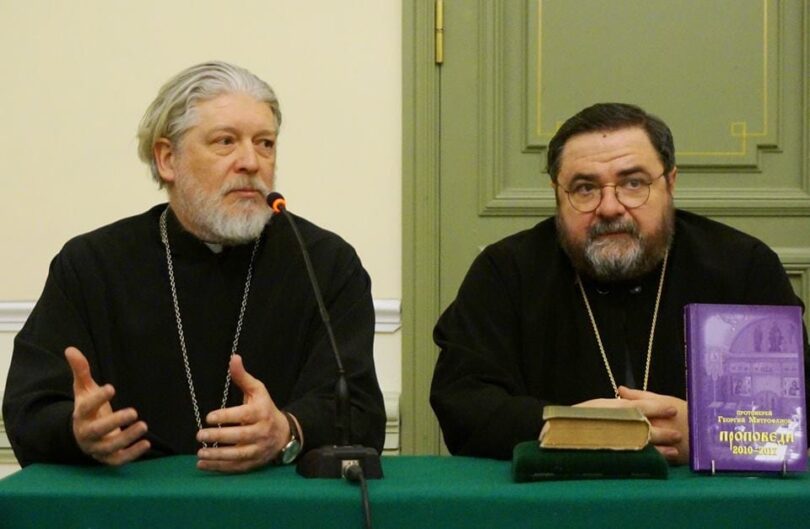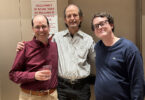I recall that when the reunification happened in 2007, you expressed the paradoxical idea that we had united far too late and far too quickly. It feels as if nothing has changed since that moment, yet objectively years have passed. What can be said about these last seven years? What thoughts do you have on the Russian Orthodox Church Outside of Russia as part of the Russian Orthodox Church?
I can return to those words that you just reminded me of, and say that in general, unfortunately, I was correct. What I said back then – “too late and too quickly” – has since then been substantiated. I will now formulate a more detailed response to this.
What do I mean by “too late”? In 2007, there was talk about the existence of that Russian diaspora – I mean this in terms not only of the church diaspora, but also the Russian diaspora as a social phenomenon, as a cultural phenomenon – which had retained the life and traditions of the Russian Empire that had collapsed in the 1917. Of course, by 2007 the Russian diaspora had in many ways distanced itself from being Russia in exile. But it would have been very important for all of us [in Russia], in a historical, religious, cultural and social context to unite with those who were able to retain these traditions better, in greater measure, than we were. The traditions were destroyed here; unfortunately, the traditions also gradually eroded in the Russian diaspora. Moreover, this is not to mention the people who replenished the Russian diaspora, I would even say starting in the seventies and especially since the nineties, who also became part of the Church Abroad – these people, of course, to a greater degree enabled the erosion of the existing traditions, and were generally not interested in seeing themselves as stewards of the mission of the Russian emigration. However, among them was another part who did discuss these issues. And unfortunately, they were formed here, outside of that Russian reality which existed and of which they dreamed, when they internally opposed the soviet world. Just like the grandchildren, great-grandchildren and great-great-grandchildren of Russian emigrants, living there [outside of Russia], they offered themselves and others a specific dream about the Russia of the past. But idealism by definition is historically barren and religously tempting. That is, essentially our belated unification resulted in both sides consisting of at best romantics and at worst, people simply reacting to circumstance. This, by the way, is quite justified. Let’s say, the Russian Orthodox Church outside Russia was going through a kind of internal crisis, an ideological conflict with new Russian immigrants with whom they needed to learn to communicate, to better understand them. On the other hand, there was an opposition [of ROCOR] to many autocephalous churches of the Orthodox world. And our reunification helped solve these problems. Reunion occured with the whole Orthodox world, and there was a better understanding of those that live here [in Russia] and what they live for. This may have been a pragmatic point, and certainly a positive one. Here I feel I should also recall something else I said back then to Fr. Nikolai Artemov: “the outsiders united with the outsiders”. To be an outsider is not always a bad thing, because there have been times in history when it is precisely the outsiders that retain a sense of truth and a sense of reality. But the fact remains that the outsiders are often not in a position to influence the course of things.
Returning now to what I meant by “too fast”. We have not seen what we expected here [in Russia]: specifically, the experience of Russian church life from the 1920-30′s, which was founded upon the principles of the All-Russian Church Council of 1917-1918, and formed the foundation of the life of the ecclesial Russian diaspora, has regrettably not been transmitted to us. And the issue was not that the messenger was not active or creative enough, but that we have not seen the return of Russians back here. And this fact was an alarming symptom, that living here continues to seem unacceptable for many Russians overseas. Not because they want an easy lifestyle, from being used to the Western standards of life, which are still far superior to ours. Instead we are talking about something different. For them, our country remains a different Russia to the one they dreamed of. But it is also the case that unfortunately, in the process of our unification there were no changes to our church regulations, for example, which would have made our regulations more like yours. You retained a certain autonomy, the status quo, but without taking into account our need to bring your principles of church life into our church life. Not just the stories told by your clergy and laity, but those regulations and principles that were developed back then at the Council of 1917-18 and tested in your parishes but that failed to materialize for decades in our churches. This did not happen. And we most certainly overestimated your ability to influence our situation here, in particular in very specific questions. Say, for example the very painful question regarding the authenticity of the remains of the Royal Martyrs.
Thank you, Fr George.












In his strangely-titled interview “The Outcasts Unite with the Outcasts”, Archpriest George Mitrofanov, himself perhaps something of an outcast, has declared that the two parts of the Russian Church united far ‘too late and far too fast’. Frankly, I am surprised by both these opinions.
Firstly, ‘too late’ is only from the viewpoint of those who want the past back. The past was of course dead 90 years after the Revolution. It is totally unrealistic to imagine that the past could be alive after 90 years, after a human lifetime. And why would you wish the past to be alive? It was the past that caused the Russian Revolution. Recreate the past and all you will do is create another Revolution. All parts of the Church have moved on, we live in the here and now, united by the New Martyrs and Confessors created by the Revolution, not united by nostalgia for a past that had so many faults.
Our unity is not that of ‘outcasts with the outcasts’, and even less of ‘the marginal with the marginal’ (as in the original Russian), but of the mainstream with the mainstream. It was precisely the marginal (whether marginal extremists of the old calendarist sort in ROCOR) or marginal extremists of the renovationist sort (in the Sourozh Diocese and elsewhere belonging to the then Patriarchal part of the Church) who rejected unity.
Too late? Our unity became inevitable after the long-awaited Jubilee Council of August 2000 and the implementation of that Council which, true, took the Church inside Russia several years. I would say that unity came just at the right time. Had we waited longer, many in ROCOR would have become impatient and left to join the Church inside Russia, as a few already had. However, had we not waited, many in ROCOR would have objected to the haste and there could have been a schism splitting ROCOR right down the middle, instead of which we only lost the tiny number of extremists on the fringes.
Secondly, ‘too fast? Here again we see the idealism of Fr George concerning the principles of the All-Russian Church Council of 1917-1918, and that they (!) had formed the foundation of the life of the diaspora of the Russian Church. In reality, some decisions of that Council were based on the democratism and liberalism of Protestant-style Kerenskyism; thank God they were not all implemented, we do not want the negative aspects of the 1917-18 Council.
Here Fr George also writes that ‘we most certainly overestimated your ability to influence our situation here’. It would have been an amazing piece of pretentiousness on the part of ROCOR if we had ever imagined that, small as we are and engaged in the mission to bring Orthodoxy to the Non-Orthodox world as we are, which is the real mission of the emigration, we could ever have influenced the situation in Russia. Internal Russian problems can only be solved by Russians inside Russia; we have no such pretensions. We did not produce the New Martyrs – they were produced in Russia – they are the ones who will provide healing inside Russia, not us. We have our own problems to solve.
Dear Father Andrew,
Thank you for pointing out to the problem with the title and for commenting on this Web site. I believe that Fr. George meant “outcasts” in a sense that church practitioners are fringe elements for both the Russian and Western worlds. I hope to see you during an annual pilgrimage this year.
The question of “who influenced who” is interesting. As far as the All Russian Council, ROCOR never claimed strict adherence to that Council. In the emigration, as far as I know, only the OCA claimed a strict adherence to the 1917-1918 Council, but, seems this declaration was mostly that … just a claim, not well backed up with “fact.”
I believe ROCOR did have “influence” in Russia. On the Moscow Patriarchate calendar in the past few days, there was a commemoration of the 20th, or 25th Anniversary of the Glorification of Saint John of Kronstadt. Of course, ROCOR Glorified Saint John of Kronstadt in 1964; Saint Xenia of Pegersburg in 1978, and the Holy New Martyrs in 1981 (among other Glorifications). These Glorifications were known in Russia, and greeted with great joy by believers … no “influence” at that time on the hierarchy of the Moscow Patriarchate, but, undoubtedly an “influence” on believers, which I understand, unhesitatingly prayed to the newly Glorified Saints. What better “influence” might there have been?
I think that our reunification was timed just right. At least no one can accuse our hierarchs of acting too quickly as they took the time to consider all aspects of our union. I believe that all happened according to God’s plan for us all. I was a recent participant in the 25th Anniversary celebration of the Glorification of our St. John of Kronstadt in Russia, and I have the feeling that the clergy and faithful in Russia are very happy that ROCOR glorified St. John just over 50 years ago because this was not possible to take place during the Soviet regime, which hated St. John. These glorifications very much connect all of us, abroad and in Russia, together, spiritually. Call it nostalgia or whatever one wishes, but this was my first visit to Russia, and I actually felt 100% percent at home there, in St. Petersburg, and I felt a great sense of oneness with the people there.
Father Michael, thank you for contributing your valuable comment.